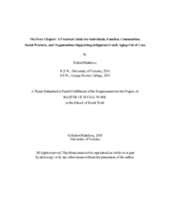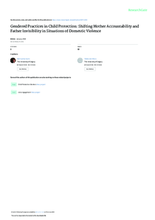Displaying 191 - 200 of 341
This article from the Tyee highlights a new report with recommendations for supporting foster youth in transitioning to independent living, which was co-researched by 8 youth from care and a a McGill University social work PhD student, Melanie Doucet.
Relationships Matter for Youth 'Aging Out' of Care is a collaborative photovoice project led by Melanie Doucet, who is a former youth in care, alongside eight former youth in care between the ages of 19 and 29 from the Greater Vancouver area.
This research utilized Indigenous methodologies rooted in oral traditions, storytelling practices, and the Medicine Wheel teachings to examine how individuals, families, communities, social workers, and organizations can assist Indigenous youth who are aging-out of foster care and are transitioning into adulthood.
This article illuminates current child protection services (CPS) worker practices in situations of domestic violence in Alberta, Canada where inclusion and exclusion decisions are made for service provision, and the ways in which documents reflect these day-to-day practices.
In the present study, the authors examined the effects of two types of initial short-term placements: emergency placements (lasting 1 to 5 days) and provisional placements (lasting 6 to 60 days) on the risks of re-entry into care in the four years following reunification.
This study involved a comprehensive literature review, an environmental scan, and interviews with 20 former youth in care in Canada, focusing on what helps and hinders youth in care to graduate from high school.
The purpose of this study was to assess vaccine coverage for a cohort of children who have been in the care of the child welfare system compared to children in the general population in Alberta, Canada.
This paper documents findings from an evaluation of the Live-In Family Enhancement (LIFE) program, and recommends that this approach be expanded for use in prevention as well as reunification.
The objective of the present study is to describe the context in which temporary placements are used by children’s services in Quebec (Canada) while analyzing the associative link between temporary placements and physical abuse as the reason for the placement.
Using linked population based data from the Manitoba Population Research Data Repository, children in the custody of CFS who turned 18 during a 10 year study period were compared to children not in custody.




